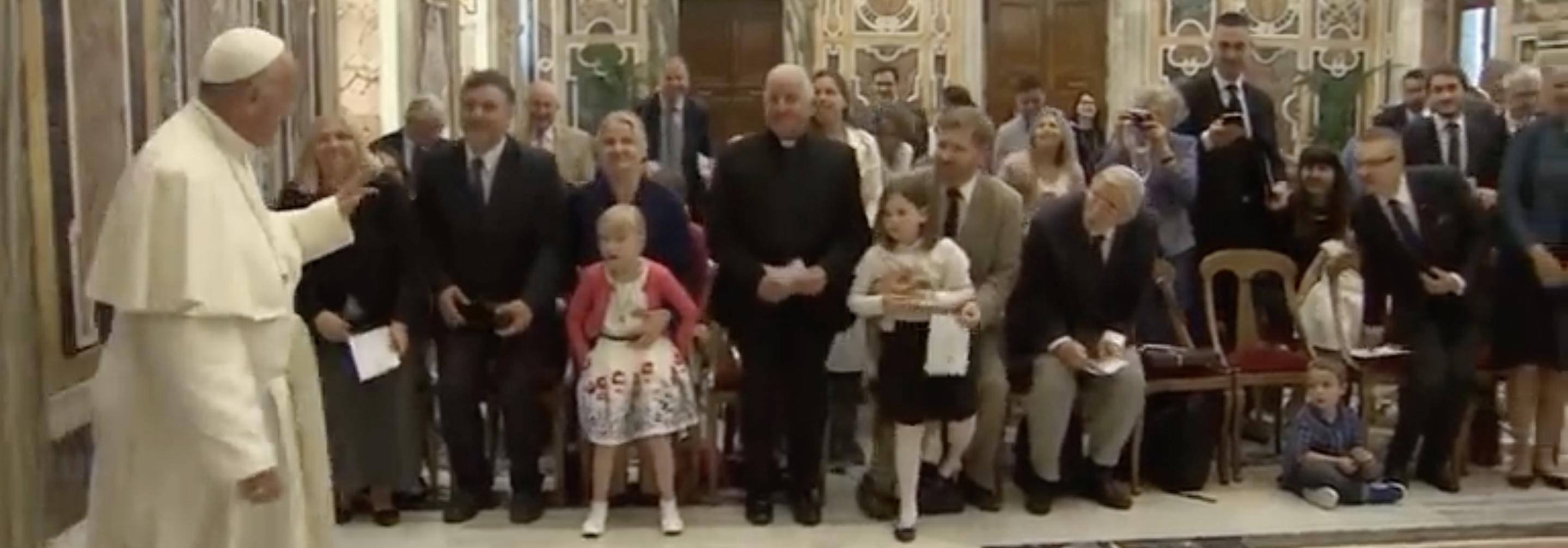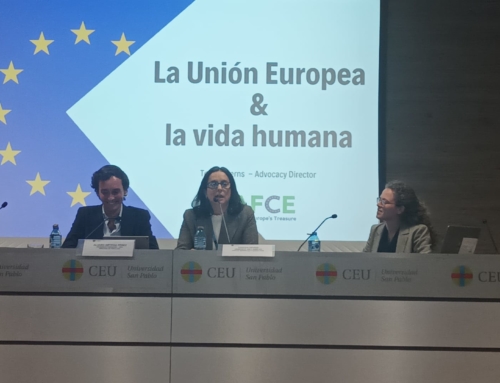18 June 2021
Between the 9th and 12th of June, the Holy See’s Dicastery for Laity, Family, and Life hosted an online forum on the topic, “Where are we with Amoris Laetitia? Strategies for the pastoral application of Pope Francis’ Exhortation.” The forum tasked itself with applying the 2016 Apostolic Exhortation Amoris Laetitia to the Church’s pastoral work. The forum’s participants included Episcopal Conferences, international ecclesial movements, and associations, including family associations. FAFCE thus participated in the online forum, alongside seventy Episcopal Conferences and more than thirty associations.
Amoris Laetitia presents the family’s importance in the modern world as a symbol of love and daily witness to the Social Teaching of the Catholic Church. Furthermore, it calls on all Catholics, clergy and laity alike, to pay special attention to families and to work together to minister to their needs.
Pope Francis opened the conference via video message, in which he presented the complementarity of omnipresent in God’s creation. He noted that “Just as the warp and the weft of the masculine and feminine, in their complementarity, combine to make up the tapestry of the family, so too the sacraments of Holy Orders and marriage are both indispensable to building up the Church as a “family of families”. In this way we will be able to have a pastoral care of families in which one breathes fully the spirit of ecclesial communion.”
The First Day: Toward a Pastoral of Family Care
On the first day of the forum, participants focused on bringing pastoral work closer to the daily realities and struggles of families. Cardinal Kevin Farrell, Prefect of the Dicastery on Laity, Family, and Life, connected the Church’s missionary style to the need to abandon elitism for an approach centered on the accompaniment of each individual person. The Dicastery’s Secretary, the Reverend Alexandre Awi Mello, presented on the ways in which Amoris Laetitia has been embraced by the Catholic Church in countries such as the United States, Italy, Nigeria, Bolivia, and Costa Rica. He also noted that other countries began the implementation of the Apostolic Exhortation at the level of more specialised pastoral offices, such as those for youth or vocations.
Dr Gabriella Gambino, the Dicastery’s Undersecretary for Family and Life, also elaborated on Pope Francis’s emphasis on the Christian catechumenate in the context of marriage. Dr. Gambino discussed the need for an itinerary of ongoing Christian formation as a means for the couple to enter more deeply into the mystery of the sacrament of marriage even as they journey into their own faith.
The Second Day: A Focus on Accompaniment and Education
The second day of the forum focused on the education of children and on the moral formation of those engaged in care. Davide and Nicoletta Oreglia Musso of Italy, co-presidents of the “Spouses in Christ” Association, began the day’s proceedings with a presentation of the Church’s millennia of teaching on relationships, which they concluded by challenging the attendees to consider how Amoris Laetitia can help Catholics today rediscover the value of those teachings.
Afterwards, the forum pivoted to the theme of educating children. The participants listened to a report by Mr Luis and Mrs Pilar Jensen of Chile, a couple that consults for the Dicastery. They presented a view of childhood education as one that must center on love, by ensuring that children feel loved by their parents, feel loved by God, and themselves know how to love. Representatives of the Archidocese of Toledo in Spain built on the relationship between love and education by presenting the work of the Archdiocese’s Escuelas de Familia, which works to bring families back to the Church by assisting them in the moral education of their children.
The Third Day: The Missionary Duty of the Family and the Importance of Spousal Relationships
Father Renzo Bonetti, spiritual assistant of the Mistero Grande Project, framed the third day’s discussion in the context of conjugal spirituality and family spirituality. The former entails the experience of spirituality based on the husband and wife alone, whereas the latter is broader and includes other members of the family, with an emphasis on children.
A Brazilian couple, Carlos E. Empke Vianna and Andréa C. Gonçales Vianna articulated a clear and practicable path toward implementing these ideas. Their presentation centered on what they experienced as part of the Encontro de Casais com Cristo (ECC). The ECC evangelises families to make them more active protagonists of the Church’s pastoral work. The ECC trains couples in marital teaches them about the Magisterium, then engages in pastoral work beginning with their parishes. In this way, the couples are made strong in their relationship with themselves and with Christ, educated on the Church’s teaching, and given experience in the pastoral of evangelisation, thereby putting theology into practice both at home and in the community.
Two consultors of the Dicastery, Marie Gabrielle and Emanuel Ménager from France, balanced out practical approach with a catechesis on the sacramental and practical effects of marriage. They presented the mission of evangelisation as the natural effect of well-lived conjugal spirituality. Just as most Catholics know that marriage has the sacramental purpose of sanctifying the couples and bringing them to salvation, the overlooked purpose of marriage is to sanctify the community in which the married couple is embedded. The great edifice of the Church stands on the daily realities of its many domestic churches. Thus, the couple is an essential agent in the work of evangelisation. Not only are couples called to co-Creatorship with God by having children, but they are also called to assist in the work of evangelisation in the simplicity of their daily lives. This reflects the supreme importance of families in the Church and society, and, by extension, of family associations as well.
The Fourth Day: The Fragility of Families
Most Rev. Victor Fernández, Archbishop of La Plata, built the first segment of the day’s discussion around the “situations that do not fully respond to what the Lord wants from us”, by which he cast light on the fragility of families and the value that fragility can have in manifesting the love of God. Amoris Laetitia calls on the Church to accompany its faithful, and the fragility of families calls attention to the abundant need for such accompaniment. However, as both the Apostolic Exhortation and the intervention of Archbishop Fernández emphasise, the accompanied couple must both consent and participate in the process. In this way, the Church and its faithful can fulfill the Exhortation’s call to increase love.
The second session of the day focused on the initiatives that grew out of the Amoris Laetitia Family Year announced by Pope Francis. Special attention went to the World Day for Grandparents and the Elderly which the Pope instituted on January 31st, 2021, and will recur each year. The first one occurs on July 25th, 2021. Vittorio Scelzo, of the Dicastery Office for the Elderly, challenged young people to go out and meet more of the elderly and to engage them in their lives, especially as pandemic conditions have limited their ability to take their proper role in the life of the Church and community.
This last call to action encapsulates the main conclusions of the forum: Amoris Laetitia teaches that Catholics cannot keep passing the buck on loving like Christ, evangelising their communities, and looking at the world through the eyes of the Gospels. At the same time, however, this is difficult without accompaniment and the support of a community. The family is the natural place to start to revivify accompaniment in the pastoral sense, which is not the sole responsibility of the parish’s pastor, but of everyone, since the parish is a family of families. The Church is thus the all-embracing parent made up of its own spiritual children, which Christ left to us as His own body. In the final analysis, Amoris Laetitia calls everyone to care for that body as though it were one’s own.
Gianluigi De Palo, President of the Italian Forum of Family Associations, FAFCE Member, also intervened together with his wife, Anna Chiara Gambino, bringing their testimony about their family life, and the important work that the Diocese of Rome is doing, together with the Dicastery, to well prepare the World Meeting of Families, that is going to take place in Rome in June 2022.
Read More on the website of the Dicastery:







